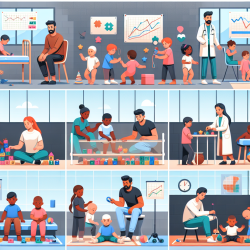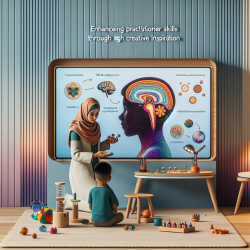Introduction
In the realm of speech-language pathology, creating optimal outcomes for children is paramount. As professionals, we constantly seek ways to improve our practices through evidence-based research. A recent study titled "Factors influencing underrepresented geoscientists’ decisions to accept or decline faculty job offers" provides valuable insights that can be translated into the field of online therapy services, particularly for children. By examining the factors influencing decision-making in diverse faculty recruitment, we can draw parallels to enhance our approach to online therapy.
Understanding Diversity, Equity, and Inclusion (DEI)
The research highlights the importance of commitment to diversity, equity, and inclusion (DEI) in decision-making processes. In the context of online therapy for children, this underscores the necessity of creating an inclusive environment that respects and values diverse backgrounds. Practitioners should strive to incorporate DEI principles by:
- Ensuring that therapy materials and resources are culturally sensitive and representative of diverse populations.
- Engaging in continuous education on DEI topics to better understand and address the unique needs of each child.
- Fostering an inclusive virtual space where children feel safe and respected, encouraging them to express themselves freely.
The Role of Mentorship
Mentorship emerged as a critical factor in the study, emphasizing its role in supporting underrepresented groups. In online therapy, mentorship can significantly enhance the professional development of practitioners, leading to better outcomes for children. Consider the following strategies:
- Establish mentorship programs within therapy organizations to guide new practitioners and share best practices.
- Encourage experienced therapists to take on mentorship roles, fostering a culture of learning and growth.
- Utilize technology to facilitate mentorship, such as virtual meetings and resource-sharing platforms.
Professionalism and Communication
The study also highlights the impact of professionalism and communication during job interviews. In online therapy, maintaining professionalism and clear communication is crucial for building trust with children and their families. Practitioners should:
- Adopt a professional demeanor in all virtual interactions, ensuring a respectful and supportive environment.
- Communicate clearly and effectively, tailoring language to suit the child's age and comprehension level.
- Seek feedback from families to continuously improve communication strategies and therapy effectiveness.
Conclusion
By applying the insights from the research on faculty recruitment to online therapy practices, we can enhance the quality of services provided to children. Emphasizing DEI, mentorship, and professionalism not only improves therapy outcomes but also fosters a more inclusive and supportive environment for all participants. As practitioners, we must remain committed to data-driven decisions and continuous improvement to ensure the best possible outcomes for the children we serve.
To read the original research paper, please follow this link: Factors influencing underrepresented geoscientists’ decisions to accept or decline faculty job offers.










